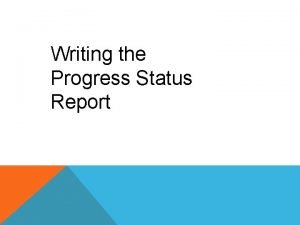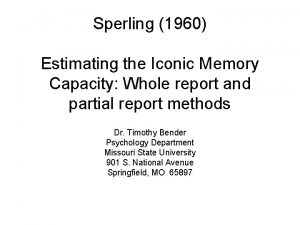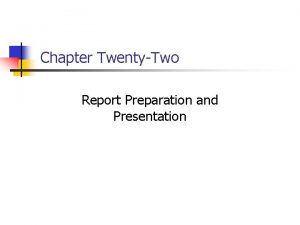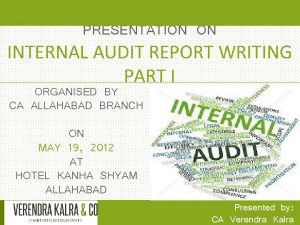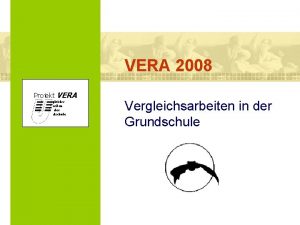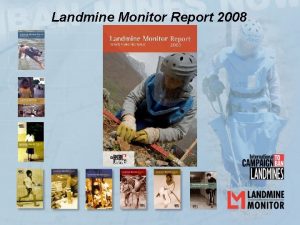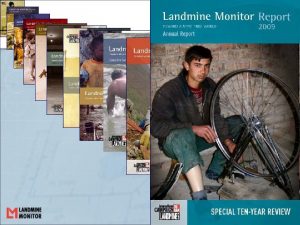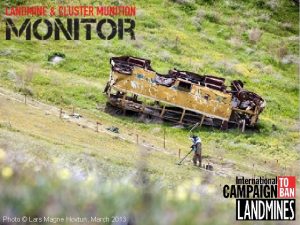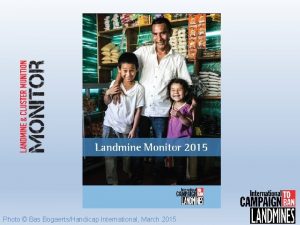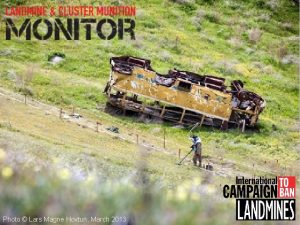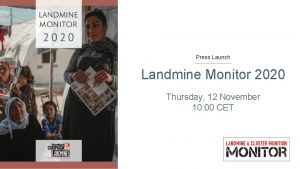Landmine Monitor Report 2008 Presentation of Landmine Monitor
















- Slides: 16

Landmine Monitor Report 2008

Presentation of Landmine Monitor Report 2008 1) 2) 3) 4) 5) 6) Ban Policy Mine Action Casualties Risk Education Victim Assistance Support for Mine Action

© HI Thailand, 27 February 2008 Status of the 1997 Mine Ban Treaty Campaigners and landmine survivors share experiences at tenth anniversary of the Mine Ban Treaty event in Norway. § 156 States Parties – over 2/3 of the world § Palau is the latest country to join the treaty

Mine Ban Holdouts § © F. Gruyer/HI, September 2007 § French child adds a shoe to a pile symbolizing the limbs and lives lost to landmines. 39 countries remain outside the Mine Ban Treaty Notable holdouts include some major stockpilers, producers or users of antipersonnel mines: China, India, Myanmar, Pakistan, Russia, and the United States

Landmine Use § © Nicole Vera/OAS, 14 April 2008 § § Emergency humanitarian demining operations in Colombia. No evidence of use of antipersonnel mines by States Parties Two governments continued to use antipersonnel mines: Myanmar and Russia Non-state armed groups used antipersonnel mines or IEDs in at least nine countries

§ 13 countries produce (or reserve the right to produce) antipersonnel mines: China, Cuba, India, Iran, Myanmar, Nepal, North Korea, Pakistan, Russia, Singapore, South Korea, the United States and Vietnam © Cambodia CBL, 10 March 2008 Production Mines stored in villager’s homes in Cambodia.

Trade § Near total global ban on trade in antipersonnel mines Low level of illicit and unacknowledged transfers ©Nepal CBL, February 2008 § Nepalese campaigners celebrate the tenth anniversary of the Mine Ban Treaty

Stockpile Destruction § States Parties have destroyed more than 42 million stockpiled antipersonnel mines During this reporting period: § § § 500, 000 antipersonnel mines were destroyed 3 States Parties completed stockpile destruction 3 States Parties missed their stockpile destruction deadlines © Turkish Ministry of Foreign Affairs, May 2008 § ICBL mission to Turkish stockpile destruction facility.

n n n Approximately 216, 000 antipersonnel mines are retained by 71 States Parties for research and training 5 States Parties have reduced the number of mines retained 15 States Parties have voluntarily reported on the intended and actual use of retained mines © Nepal CBL, 1 October 2007 Mines Retained for Training Nepalese Army demining demonstration.

Landmine Problem and Mine Clearance § 70 countries and six other areas are believed to be mineaffected In 2007, 122 km 2 of mined areas and 412 km 2 of battle areas were cleared © Marc Vaillant/DCA, April 2008 § Female deminer in DR Congo.

Challenges in Meeting Clearance Deadlines © CNAD, June 2007 § Deminers at work in northern Chile. 15 of 26 States Parties with 2009 Article 5 mine clearance deadlines have asked for extensions

© Cambodia CBL, September 2007 Landmine Casualties Cambodian landmine survivor tends a home garden. In 2007: n Data collection remained inadequate n At least 5, 426 new casualties recorded in 64 states and 6 areas n Majority of casualties were civilian n Half of civilian casualties were children

Risk Education § © S. Bouko/HI, December 2007 § § Children read risk education leaflets in Kenya 8. 4 million people received mine/ERW risk education (RE) in 61 countries in 2007 saw the highest level of RE ever recorded by Landmine Monitor RE was inadequate in over 30 countries, including in seven of the 10 with the most recorded casualties

n n n Hundreds of thousands of mine and ERW survivors around the world Assistance to victims of mines and ERW remains inadequate Community-based rehabilitation, mental health and economic reintegration programs continued to be neglected in 2007 © M. Kokic/ICRC Victim Assistance A landmine survivor physiotherapist treats a child in Afghanistan

Support for Mine Action © Joseph Wenkoff, April 2008 In 2007: § International mine action funding totaled US$431 million, the second highest level of funding to date § Top donors: US, Norway, Canada, EC § Top recipients: Afghanistan, Iraq, Cambodia, and Sudan Landmine survivor and barber at work in Albania

Thank You. www. icbl. org/lm/2008 lm@icbl. org Media Kit: www. icbl. org/lm/2008/media
 What is a butterfly mine
What is a butterfly mine 2008 2008
2008 2008 Difference between status report and progress report
Difference between status report and progress report Sperling 1960
Sperling 1960 Book report powerpoint presentation
Book report powerpoint presentation Report preparation and presentation
Report preparation and presentation Lab report presentation
Lab report presentation Report preparation and presentation in marketing research
Report preparation and presentation in marketing research Internal audit report writing
Internal audit report writing Fetal lie
Fetal lie Vertex presentation and cephalic presentation
Vertex presentation and cephalic presentation Ipam windows server 2008
Ipam windows server 2008 2008-2009 school year
2008-2009 school year Pictures of garbage: the gipsy (magna)
Pictures of garbage: the gipsy (magna) Vera 2008
Vera 2008 Microsoft server
Microsoft server 2008 generation called
2008 generation called


